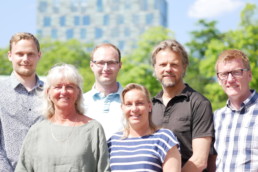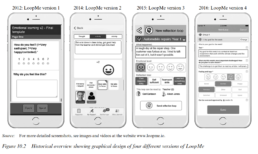A team of change makers
Or perhaps troublemakers?
We built LoopMe because we have a vision for a better society. A society where more people are engaged developmentally and reflect upon it more, and where their deep reflections are made more visible to their leaders. Most people want change to happen, but fewer want to change, so we sometimes end up short.

THE LOOPME TEAM

Carin Sävetun, CEO and co-founder
Carin works primarily on the development and support of the LoopMe system. She is also a project leader and research assistant for various impact studies. She designs and manages different tailor-made customer solutions for the LoopMe system in terms of quality objectives, adjustments, and user training.
Co-author of four studies on the effects of entrepreneurial learning. She is co-founder of the non-profit association FramtidsFrön i Väst, where she worked together with 15 different municipalities in Western Sweden to encourage the work of entrepreneurship in schools. She has previously been regional manager of the organization Junior Achievement in the region of Gothenburg.

Martin Lackéus, Co-founder
Martin is a PhD in Entrepreneurial Education at Chalmers University of Technology and part of the Faculty of the Chalmers School of Entrepreneurship. Researching, among other things, what effects entrepreneurial learning with a focus on value creation has on student motivation and student achievement, plus the assessment of experience-based learning.
Having worked with 20 different municipalities, schools and colleges to support them in the work of value-creating learning through practical action research, he also has a vast experience in IT development.

Patrik Bäckström, CTO
Patrik has been with us since 2015 and has been involved from the beginning of the project, including building up the entire technical structure around the LoopMe system, from frontend via mobile apps to our backend server databases. Today, Patrik works primarily on the development of new functionality, support cases, graphical user interfaces, and further development behind the scenes.
Patrik has previous experience as CEO of We Know IT AB, where he worked on digitalisation for a variety of customers across various different industries.
OUR UNIQUE STORY
2012: A lazy researcher took to digital means
The LoopMe journey started back in 2012 at Chalmers University of Technology, when a lazy researcher named Martin wanted to collect data remotely from his students for a research study and designed a mobile survey for the 14 participants. The resulting survey was launched later that year, and had two very simple questions – “How do you feel?” and “Why do you feel like this?” See the figure below, taken from a book chapter about LoopMe that you can read here. The survey was completed 556 times by the participants over a period of 18 months. The data collected was later used for a research article published in the International Journal of Management Education; see here.

What was intriguing about the data was that the two very simple questions allowed the researcher to see right into “the minds” of the students. The student reflections were so emotionally charged and introspective, and the researcher offered so much insight. It was clear already at this stage that a significant discovery had been made through focusing on students’ most emotional learning events.
2014: The first “real” versions of LoopMe
In late 2013, a discussion took place between the researcher Martin and a school consultant, Christer. Martin showed the compelling data coming from the emotional events survey to Christer, and the immediate response was, “We have to build this properly; this can really help a lot of teachers!” After some time, Martin was convinced, and they founded a spin-out venture in order to hire programmers who could build a proper mobile app. An example screenshot is shown in the figure above. The most immediate aim of building LoopMe was to use it in a study commissioned by the Swedish National Agency of Education (SNAE) at entrepreneurial primary schools. LoopMe’s second version was completed in early September 2014 and was then tested on 250 participants in two separate entrepreneurial education studies, which were later published in highly regarded scientific journals, as can be seen here and here.
2015: Professionalization of the company
The year after, a new version was built from the ground up, with a professionally designed graphical user interface. This was also the year our CEO joined us, Carin. She had been involved in many of the earliest studies conducted already in 2013 in primary schools, with a simple web survey. In 2015, she joined us more long-term, and has since been our CEO. A small spin-out was becoming increasingly professional. The team of programmers at this point consisted of five people, so this was a development heavy time.
2016: LoopMe gets mandatory tasks and content packages
The first three versions of LoopMe were all based on the idea that users would determine whenever they wanted to report something to their leaders, just like in most established social media platforms. This worked well in research projects where teachers could keep reminding the participants to produce data when something relevant happened. But it was difficult to get more than around 15‒30 percent of a group to participate. The founding team therefore decided to adjust the focus of LoopMe, making mandatory tasks a standard functionality for all users. While most users had not asked specifically for this, it was hypothesized to be a way to increase perceived relevance and engagement among a wider base of potential users.
This change clarified usage of LoopMe and allowed for more sustainable usage patterns among participants in a group. The resulting difficulty instead became how leaders were to think around the design of mandatory tasks. This triggered the development of ‘content packages’, constituting ready-made sets of 3‒20 tasks and associated tags that any leader could pick up and distribute to a group of users. The fourth version of LoopMe was completed in August 2016.
A change that resulted in an even more powerful research tool
The introduction of mandatory tasks in LoopMe opened for a more powerful way to collect and analyze research data. The tasks allowed for a more fine-grained design of participant behavior. The logical link between tasks, emotional ratings and user-generated text allowed for quantifying cause-effect relations between independent variables (i.e., behavioral tasks) and dependent variables (i.e., emotions, tags and written reflections). Since many of the research oriented functions were kept in version 4 of LoopMe, the research team found itself with even more powerful means at hand for data collection and analysis than before.
THREE PARALLELL CHANGE AGENDAS IN SOCIETY
Presently, we can see how the unique LoopMe journey has put us on track to change education as we know it in so many powerful ways. We are currently leading three important change agendas in society due to the power of LoopMe, which has allowed us to make a positive change in so many different areas at the same time. The three key areas are:
Reinventing action-based education
Teachers have used LoopMe to design action-based learning experiences by breaking the social learning process down into manageable tasks. This has now made it possible to get significant quality increases in many different educational areas.
Entrepreneurial education has been changed significantly through the introduction of value creation pedagogy, which was identified through LoopMe-based research. The quality of apprenticeship education has been significantly improved through digitizing the collaboration between vocational teachers, their students, and their supervisors at various workplaces.
A significant rise in Swedish content packages related to action-based education demonstrates the rapid spread of LoopMe among teachers in many action-based areas.
Reinventing school improvement
It has been known for some time that action research is a suitable research methodology for school improvement. What has been lacking is a tool that facilitates such work in practice.
LoopMe has shown to be capable of providing simplified and efficient daily interaction between key actors in school improvement work. When actioned digitally, it generates substantial data that can later be accumulated for important analysis in school improvement work. LoopMe has been shown to be capable of both facilitating the spread of hypothesized interventions across many teachers and analyzing subsequent outcomes, which was not previously possible .
An increase in Swedish content packages related to school improvement illustrates the growth of LoopMe among school developers in many areas.
Reinventing educational research
A third area that LoopMe has shown itself capable of revolutionizing is educational research. Due to a conservative research community, this area is underdeveloped in relation to the two other areas, but the potential is equally strong.
Some researchers have spotted the opportunity, and are now conducting research studies in areas as varied as language development in pre-schools, programming education in primary schools, corporate entrepreneurship training at university level, and digital language education in lower secondary schools. Judging from the many tangible benefits observed in the two other areas, there is reason to believe that educational research will also be revolutionized through LoopMe.
We have yet to see an increase in content packages related to educational research.
LoopMe today: a social enterprise journey
The many interesting opportunities to improve society illustrate a key driver behind the LoopMe team. We want to contribute to a better society, and we can achieve this primarily through changing education. We measure our success not in terms of economic growth or profits, but in terms of improvements in society. That makes the company behind LoopMe, Me Analytics AB, a classical social venture. Our goal is to build a better society, and our means is a venture that develops a unique IT tool that we call LoopMe. You are warmly welcome to join us on our journey to make a difference. Contact us and let us know how you want to help us help society!


